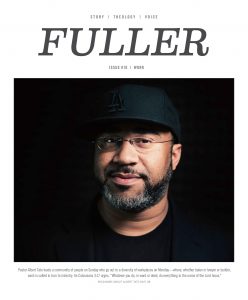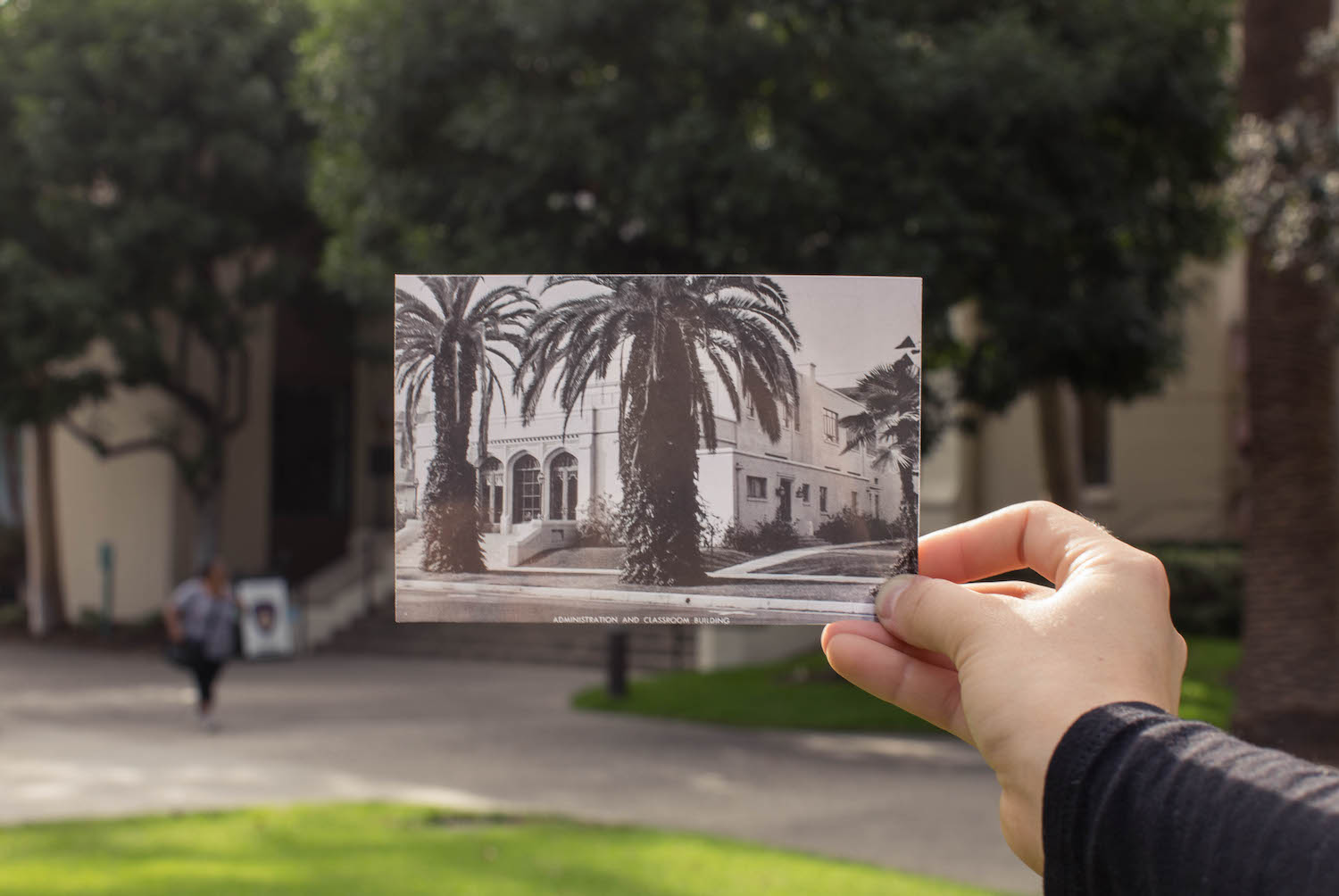
“Heavenly Father, may Thy richest blessing rest upon each and every student who is up against dark clouds right now not knowing which way to turn in some matters—Thou wilt supply every need according to Thy riches, and Thy grace is sufficient. We thank Thee for the godly faculty here and administrative force and for every student, and we pray for every alumnus now wherever they may be, and those upon the mission field, and those in the pastorate, those that are teaching. Keep us as one great family and God grant that out of this seminary make students like Peter, Philip, and Paul, and Abraham and Joseph and Moses. Lord, we ask this in His name, amen.”
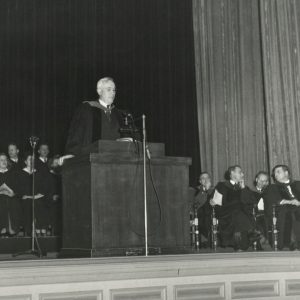 + Charles Fuller, founder of Fuller Seminary, prayed these words at the first convocation of the school in 1950. Decades later, his words still resonate as students graduate from Fuller’s three schools to serve in every vocation. Historical voices below convey this same urgency, expressing Fuller’s foundational commitments throughout its decades of growth and change. Unless credited, voices below are quoted from Russell Spittler’s book Fuller Voices: Then and Now, and you can find more information as well as additional resources on Fuller’s history on the final page.
+ Charles Fuller, founder of Fuller Seminary, prayed these words at the first convocation of the school in 1950. Decades later, his words still resonate as students graduate from Fuller’s three schools to serve in every vocation. Historical voices below convey this same urgency, expressing Fuller’s foundational commitments throughout its decades of growth and change. Unless credited, voices below are quoted from Russell Spittler’s book Fuller Voices: Then and Now, and you can find more information as well as additional resources on Fuller’s history on the final page.
As Christian students we shall fail miserably if we do not unite the academic with the practical, the discipline of the mind with the training of the heart. In fact, these are but two sides of the same coin. . . . The end of all theological knowledge is godliness of life.”
+ Paul Jewett (1919–1991) was a systematic theologian at Fuller and a public advocate for gender equality in ministry, reflected in his book Man as Male and Female.
“I submit to you that here is a profound bit of biblical theology, which, if we could instill in our business laymen, could create a real Christian social conscience. Whoever men are, whatever their condition, whatever their background, whatever their situation, they are the creatures of God; and I must treat them as creatures of God. The image of God may be marred, it may be distorted, it may be blurred; but they are still God’s creatures, and I must treat them as such.”
+ George Eldon Ladd (1911–1982) was a professor of New Testament exegesis and theology at Fuller.
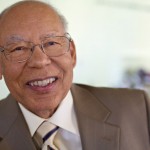 “Here is the real question: What does it mean to be excellent at Fuller Theological Seminary, not only in terms of our scholarship, and our research, and our writing, but as well in our preparation for Christian ministry as missionaries, evangelists, psychologists? What does it mean to translate the word excellence in the pursuit of the fruits of righteousness? Somehow or other, I have a sneaking suspicion that God wants us to be as he is—in the world. And I have a sneaking suspicion that if you follow Jesus Christ this is exactly where you’re headed. And I also have a sneaking suspicion that if you and I consent to this, we might even like it. Amen?”
“Here is the real question: What does it mean to be excellent at Fuller Theological Seminary, not only in terms of our scholarship, and our research, and our writing, but as well in our preparation for Christian ministry as missionaries, evangelists, psychologists? What does it mean to translate the word excellence in the pursuit of the fruits of righteousness? Somehow or other, I have a sneaking suspicion that God wants us to be as he is—in the world. And I have a sneaking suspicion that if you follow Jesus Christ this is exactly where you’re headed. And I also have a sneaking suspicion that if you and I consent to this, we might even like it. Amen?”
+ William Pannell, professor emeritus of preaching, began as a Fuller trustee, joined the faculty in 1974, and taught for 40 years. The seminary recognized his tremendous service to Fuller and the whole church with the 2015 renaming and dedication of the William E. Pannell Center for African American Church Studies.
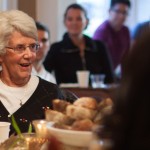 “Fuller’s call, as I understand it, has always been clear. We are a rescue and rehabilitation station for women whose gifts have been stifled, whose longing to serve God freely has been ignored or shamed. We need to stay true to that call. . . . As long as there are places where anyone is not allowed to use the gifts s/he has in the service of the ministries of Christ, Fuller will need to continue faithfulness to that call. This is not “PC”; this is obedience to the God whom we all, mutually, serve.”
“Fuller’s call, as I understand it, has always been clear. We are a rescue and rehabilitation station for women whose gifts have been stifled, whose longing to serve God freely has been ignored or shamed. We need to stay true to that call. . . . As long as there are places where anyone is not allowed to use the gifts s/he has in the service of the ministries of Christ, Fuller will need to continue faithfulness to that call. This is not “PC”; this is obedience to the God whom we all, mutually, serve.”
+ Libbie Patterson, Fuller’s first director of the Office of Women’s Concerns, reflecting on the mission of Fuller in empowering women. Listen to Libbie share stories from her time at Fuller at Story Table: Women.
Voices from Fuller’s Leadership
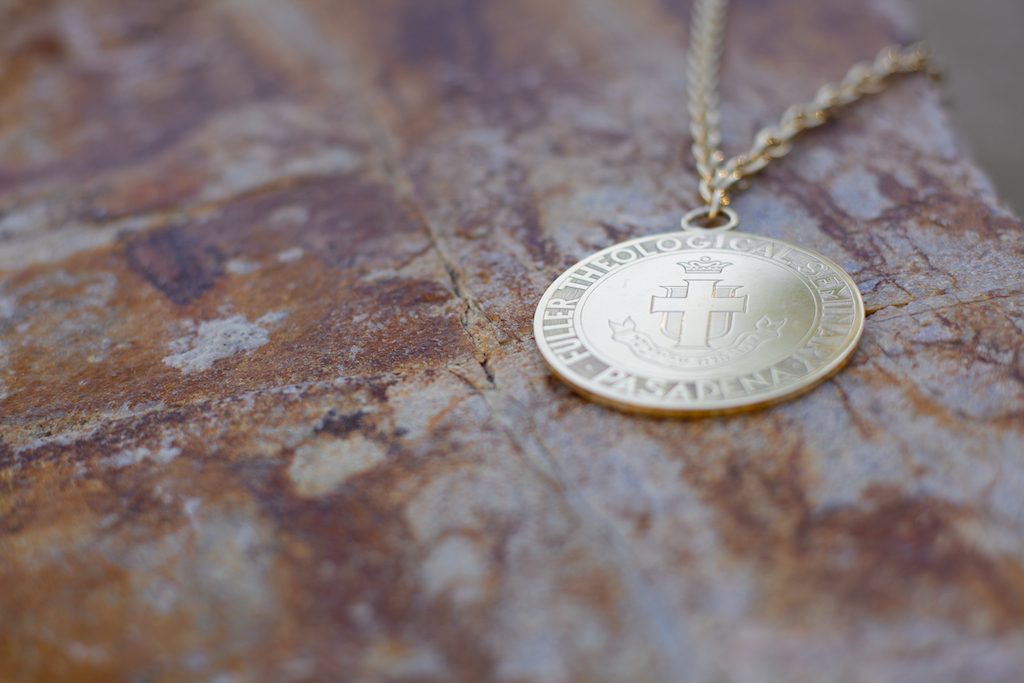
+ The quotes below are drawn from the inauguration speeches of Fuller Seminary’s five presidents. A time of both celebration and reflection, inaugurations provide space to reconsider past commitments in light of present-day realities and future goals. Taken together, these quotes express a unified vision for “the positive presentation of the Christian faith in a critical world.” Pictured above: the presidential medal passed down through decades of leadership.
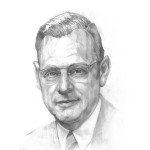 “We want the positive presentation of the Christian faith in a critical world. By the grace of God we will have it. That means a positive presentation of the gospel. That means that in our doctrinal statement included in the charter we will have a statement whereby we believe the Bible to be the Word of God—the watershed of our modern movement one way or the other today is that factor!” — Harold John Ockenga
“We want the positive presentation of the Christian faith in a critical world. By the grace of God we will have it. That means a positive presentation of the gospel. That means that in our doctrinal statement included in the charter we will have a statement whereby we believe the Bible to be the Word of God—the watershed of our modern movement one way or the other today is that factor!” — Harold John Ockenga
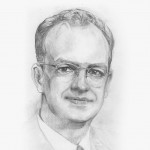 “With spiritual conviction and firmness of moral purpose the seminary strives to preserve and propagate the theological distinctives that inhere in the institution itself. . . . [A] seminary family has not yet intelligently come to grips with the eternal gospel until it rises to its feet and concretely assents to its own theology: ‘I believe in God the Father Almighty, Maker of heaven and earth; and in Jesus Christ His only Son our Lord.’” — Edward John Carnell
“With spiritual conviction and firmness of moral purpose the seminary strives to preserve and propagate the theological distinctives that inhere in the institution itself. . . . [A] seminary family has not yet intelligently come to grips with the eternal gospel until it rises to its feet and concretely assents to its own theology: ‘I believe in God the Father Almighty, Maker of heaven and earth; and in Jesus Christ His only Son our Lord.’” — Edward John Carnell
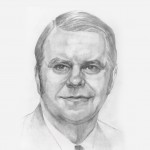 “As time brings changes, approaches to the ministry may change; refinement of methods of preaching, techniques of counseling, and administrative skills may take place. . . . The Christian knows that it is love and not knowledge that stretches man to his full height. His life has been gripped by the grace of God, and he can never be glib or casual again. He has heard the twin themes of mercy and judgment, and their ring penetrates all the other tunes of life. This is a day for recruiting and enlisting, a day of enduring hardness, running with patience, keeping a firm hand on the plow and not looking back.” — David Allan Hubbard
“As time brings changes, approaches to the ministry may change; refinement of methods of preaching, techniques of counseling, and administrative skills may take place. . . . The Christian knows that it is love and not knowledge that stretches man to his full height. His life has been gripped by the grace of God, and he can never be glib or casual again. He has heard the twin themes of mercy and judgment, and their ring penetrates all the other tunes of life. This is a day for recruiting and enlisting, a day of enduring hardness, running with patience, keeping a firm hand on the plow and not looking back.” — David Allan Hubbard
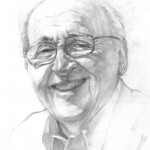 “Seminaries cannot be instruments of spiritual renewal unless they are also communities that are being renewed. And in a time when we are expanding our sense of what a campus is, and promoting more flexible academic calendars to accommodate part-time and commuting students, it is especially important that we give focused attention to new modes of spiritual formation and community life. . . . My hope is that we will cultivate in new ways the patient restlessness that comes to those who have fled to the Savior for mercy, have felt his tender embrace, and are thereby empowered to serve as willing agents of his gentle guidance in a broken and wounded world. This is what it means to renew the vision in our own day of educating for the Kingdom.” — Richard J. Mouw
“Seminaries cannot be instruments of spiritual renewal unless they are also communities that are being renewed. And in a time when we are expanding our sense of what a campus is, and promoting more flexible academic calendars to accommodate part-time and commuting students, it is especially important that we give focused attention to new modes of spiritual formation and community life. . . . My hope is that we will cultivate in new ways the patient restlessness that comes to those who have fled to the Savior for mercy, have felt his tender embrace, and are thereby empowered to serve as willing agents of his gentle guidance in a broken and wounded world. This is what it means to renew the vision in our own day of educating for the Kingdom.” — Richard J. Mouw
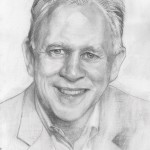 “If God is God, and if God has spoken in Jesus Christ for the salvation of the world, then none of this personal or global reality lies beyond God’s arms. And if none of this lies beyond God’s arms, then God’s people are meant to make that embrace visible and tangible. And if that is the calling of God’s people, then educating Christ’s people for such ministry in the world is Fuller’s call. Now is a moment to acknowledge the world’s great need, but, even more importantly a moment to consider Fuller’s vocation in light of God’s great love.” — Mark Labberton
“If God is God, and if God has spoken in Jesus Christ for the salvation of the world, then none of this personal or global reality lies beyond God’s arms. And if none of this lies beyond God’s arms, then God’s people are meant to make that embrace visible and tangible. And if that is the calling of God’s people, then educating Christ’s people for such ministry in the world is Fuller’s call. Now is a moment to acknowledge the world’s great need, but, even more importantly a moment to consider Fuller’s vocation in light of God’s great love.” — Mark Labberton
Heavenly Sunshine: Letters from the Beginning
“No sort of literature is more personal and therefore more captivating than the letter. It may seem a modest form beside the epic of the novel, but we should never forget that the New Testament itself is made up of letters, some to young churches, some to individuals—as Paul’s letter to Philemon—and all of them highly personal. For that reasons we know more about Paul than any other man in the  apostolic age. There is, then, the high- est propriety in the time honored custom of publishing correspondence. . . . Coming from men and women in many lands and many stations of life, they reveal the spectrum of the human heart in its conflict with sin and contact with God. To read them is an education; to understand them, a foretaste of glory.”
apostolic age. There is, then, the high- est propriety in the time honored custom of publishing correspondence. . . . Coming from men and women in many lands and many stations of life, they reveal the spectrum of the human heart in its conflict with sin and contact with God. To read them is an education; to understand them, a foretaste of glory.”
+ Grace Payton Fuller. During every broadcast of the Old Fashioned Revival Hour, Grace Fuller, wife to Charles Fuller, would read letters from listeners in her segment “Heavenly Sunshine.” The letters quoted on this page, written as the school was first being established, are shared in the same spirit.
“It was the highlight of my trip in the West [to visit you and Mrs. Fuller]. It was a spiritual benediction to be at the seminary. This will be the great and lasting work of your ministry. I am convinced that Fuller Seminary is needed now more than ever and shall do all I can to help in the years to come.”
+ Billy Graham to Charles Fuller
“I believe that the implication of Christian love is that we should be able to recognize differences of opinion in secondary matters of doc- trine and such differences should be no impediment to anyone’s having a teaching post on the Faculty of Fuller Seminary. It is, in my judgment, a healthy and wholesome situation when different points of view in doctrine are held in love, providing these matters are not essential to the evangelical, orthodox, Protestant faith.”
+ Charles Fuller to Harold Lindsell
“Dr. Smith also mentioned to me the disturbance caused in the minds of some students about learning that the last part of Mark’s gospel is not authentic. This, of course, is a debatable question, but the best Greek authorities of even the most conservative schools like Dr. Machen held it to be inauthentic. Ihope that as the days go by we will be able to blaze a trail of evangelical scholarship that will not close its eyes to such facts as these so as to make itself a butt of ridicule on the part of educated secular men and on the other hand which will be able to defend the truth as it ought to be defended.”
+ Harold Ockenga to Charles Fuller
“For three years I have shrunk from the thought of establishing this school, for I am not an educator and I am approaching 59 years of age. But the vision and great need have enlarged
before me and been pressed upon me until it seems I could not turn away from it.”
+ Charles Fuller to Harold Ockenga
We shall continue at Fuller, by God’s grace, to do what we must do.
We shall hope, moreover, to do it better than we ever have; We shall try to do it with courage and goodwill.
We shall rejoice at every sign which points to the presence of brothers and sisters who share our concerns, and we shall place our hands and hearts alongside theirs in the effort to pursue this manifold mission which, we believe, sounds from the call of God to his people.
And we shall seek divine resources at every turn:
wisdom for discernment to choose right and do well;
forgiveness for constant failure in the choosing and the doing;
grace to accept every enablement that our beneficent God may send our way.
+ Fuller’s “Mission Beyond the Mission” was composed and adopted by trustees and faculty in 1983. Written to clarify and recommit to the values established at Fuller’s beginning, the epilogue concludes by reaffirming a spirit of “courage and goodwill” in the midst of new challenges. Read the whole document online.
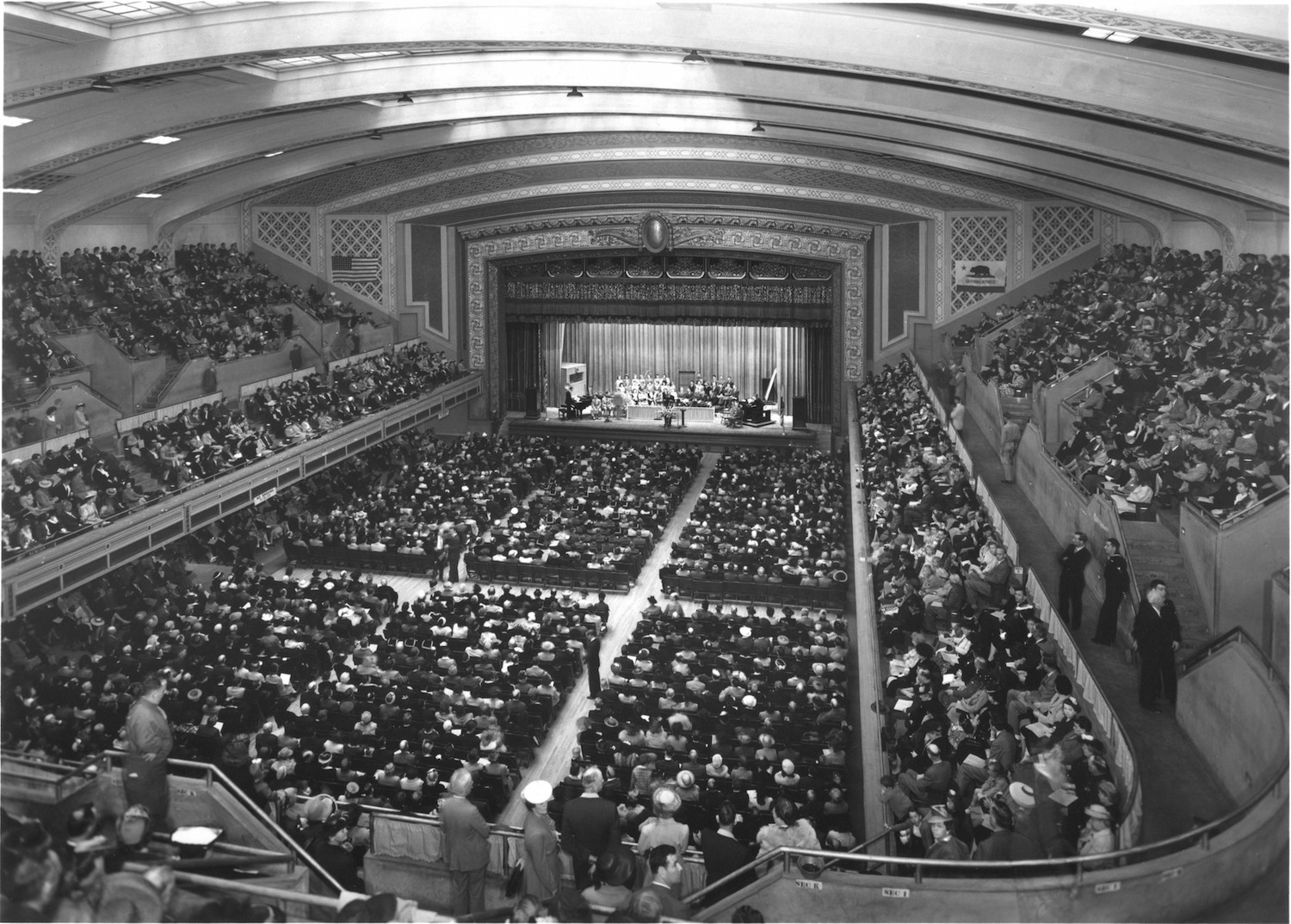
Give The Winds a Mighty Voice
Daniel P. Fuller (Word Books, 1972)
Heavenly Sunshine: Letters to the “Old-Fashioned Revival Hour”
Grace Payton Fuller (Fleming H. Revell, 1956)
SWM/SIS at Forty: A Participant Observer’s
View of Our History
Charles H. Kraft (William Carey Library, 2005)
Psychology and the Cross: The Early Years of Fuller Seminary’s School of Psychology
H. Newton Maloney and Hendrika Vande Kemp (Fuller Seminary Press, 1995)
Reforming Fundamentalism: Fuller Seminary and the New Evangelicalism
George Marsden (Eerdmans, 1987)
Fuller Voices: Then and Now
Russell P. Spittler, ed. (Fuller Seminary Press, 2004)
The Old Fashioned Revival Hour and the Broadcasters
J. Elwin Wright (Fellowship Press, 1940)
+ Special thanks to Alyson Thomas, Fuller’s archivist, for her assistance on these pages. Listen to original episodes of the Old Fashioned Revival Hour online.

